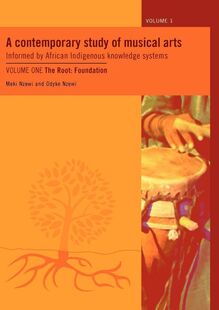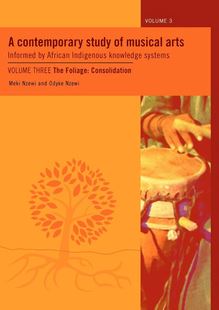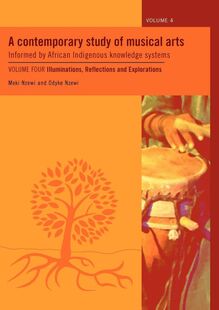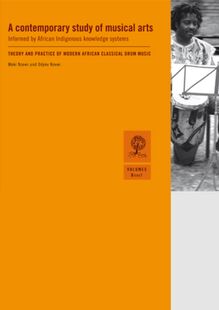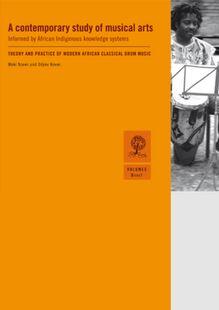-
 Univers
Univers
-
 Ebooks
Ebooks
-
 Livres audio
Livres audio
-
 Presse
Presse
-
 Podcasts
Podcasts
-
 BD
BD
-
 Documents
Documents
-
- Cours
- Révisions
- Ressources pédagogiques
- Sciences de l’éducation
- Manuels scolaires
- Langues
- Travaux de classe
- Annales de BEP
- Etudes supérieures
- Maternelle et primaire
- Fiches de lecture
- Orientation scolaire
- Méthodologie
- Corrigés de devoir
- Annales d’examens et concours
- Annales du bac
- Annales du brevet
- Rapports de stage
La lecture à portée de main
216 pages
English
A Contemporary Study of Musical Arts Informed by African indigenous knowledge systems: Volume 1 , livre ebook
216 pages
English
YouScribe est heureux de vous offrir cette publication

Description
Volume 1 – The Root: Foundation Modern literacy education in African music has hitherto focused more on observed context studies. The philosophical rooting and the psychological and therapeutic force that ground African indigenous musical arts have not been much discerned or integrated. Much needed in contemporary education, then, are integrative studies and literature materials that represent the intellectual base of the knowledge owners and creators, and which will ensure cognitive understanding of the indigenous musical arts systems of Africa.There is as yet no comprehensive, learner-centred book that fosters African indigenous knowledge perspectives and rationalisation about the musical arts. The concern over the years has been for the production of research-informed books for modern, systematic education in African musical arts that derive in essence from the original African intellectual perspectives about the sense and meaning of music – indigenous to contemporary.The five volumes of the musical arts study series derive from 36 years of research and analytical studies in African musical arts. The volumes address the pressing need for learning texts informed by the indigenous African musical arts systems that target tertiary education. The texts incorporate knowledge of conventional European classical music as they relate to the unique features of African musical arts thinking and theoretical content. The contemporary African musical arts specialist needs secure grounding in his/her own human-cultural knowledge authority in order to contribute with original intellectual integrity to African as well as global scholarship discourse and knowledge creation.
Sujets
Informations
| Publié par | African Minds |
| Date de parution | 22 mars 2012 |
| Nombre de lectures | 4 |
| Langue | English |
| Poids de l'ouvrage | 5 Mo |
Extrait
ACONTEMPORARYSTUDYOFMUSICALARTS INFORMEDBYAFRICANINDIGENOUSKNOWLEDGESYSTEMS
VOLUME1
THEROOT– FOUNDATION
Meki Nzewi
Ciimda series
A contemporary study of musical arts informed by African indigenous knowledge systems Volume 1
Author: Meki Nzewi Music typesetting & illustrations: Odyke Nzewi Reviewer and editor: Christopher Walton Copy editor: Hester Honey Music instrument illustrations: Themba Simabine Proofreading: Chérie M. Vermaak Book design and typesetting: Janco Yspeert
ISBN 978-1-920051-62-4
© 2007 Centre for Indigenous Instrumental African Music and Dance (Ciimda) First edition, first impression All rights reserved
Production management: Compress www.compress.co.za
CONTENTS
INTRODUCTION
MODULE 101:MUSICALSTRUCTUREANDFORMUNIT 1 –R EVIEW OF THE ELEMENTS OF MUSIC WRITING TOPIC 1 Symbols for writing music TOPIC 2 Graphic representation of pitches TOPIC 3 Identifying and writing intervals or steps TOPIC 4 Measurement of musical time UNIT 2 –COMPONENTS,STRUCTUREANDFORMOFAMELODY TOPIC 1 Aural and visual features of a melody TOPIC 2 The structure of a melody / UNIT 3 –TONE PITCHORDER,SCALESYSTEMANDKEYS TOPIC 1 Tone order TOPIC 2 Scale system TOPIC 3 Keys
MODULE 102:FACTORSOFMUSICAPPRECIATIONUNIT 1 –FACTORSOFMUSICKNOWINGAND MUSIC APPRECIATION A IN INDIGENOUS FRICAN CULTURES TOPIC 1 Pulse in African music TOPIC 2 Music and dance relationship in African musical arts TOPIC 3 Cultural sonic preferences TOPIC 4 Cultural rhythm TOPIC 5 Psychical tolerance UNIT 2 –C REATIVE LISTENING TOPIC 1 Matching melodies TOPIC 2 Improvising/extemporizing on a shared primary melody UNIT 3 –ANALYTICALPERCEPTION TOPIC 1 Reproducing and analyzing rhythm statements TOPIC 2 Reproducing and analyzing melodic themes TOPIC 3 Reproducing and analyzing melorhythmic themes TOPIC 4 Identifying intervals
vii
1 3 3 6 9 16 20 20 21 31 31 33 34
47
49 49 51 52 52 53 54 54 60 62 62 69 71 71
UNIT 4 –TECHNICALREPRODUCTIONOFRECEIVEDSOUND TOPIC 1 Hearing, reproducing and writing rhythm patterns TOPIC 2 Hearing, reproducing and writing melodies TOPIC 3 Hearing, reproducing and writing melorhythmic themes TOPIC 4 Hearing, reproducing and writing intervals
MODULE 103:MUSICINSTRUMENTSUNIT 1 –A PPROACH TO IDENTIFYING MUSIC INSTRUMENTS TOPIC 1 Classification of music instruments UNIT 2 –T YPES OF MEMBRANOPHONE TOPIC 1 Singleheaded, openended membrane drums TOPIC 2 Kettledrums: mortarshelled, singleheaded drums TOPIC 3 Doubleheaded membrane drums UNIT 3 –TYPESOFIDIOPHONE TOPIC 1 Slit drums TOPIC 2 Xylophones TOPIC 3 Lamellaphone/finger piano TOPIC 4 Bells TOPIC 5 Rattles, shakers and friction rasps TOPIC 6 Plosive tubes – aeroidiophones TOPIC 7 Clappers and castanets TOPIC 8 Calabash drums TOPIC 9 Stamping sticks and poles UNIT 4 –TYPESOFAEROPHONE(WINDINSTRUMENTS) TOPIC 1 Flutes TOPIC 2 Reed instruments clarinet and oboe TOPIC 3 Pitch pipes and whistles TOPIC 4 Horns and trumpets TOPIC 5 The musical pot TOPIC 6 Mirlitons TOPIC 7 Spinning blades (bull roarer) UNIT 5 TYPESOFCHORDOPHONE(STRINGINSTRUMENTS) TOPIC 1 Monochords – singlestring instruments TOPIC 2 Lutes TOPIC 3 Lyres TOPIC 4 Harps TOPIC 5 Zithers UNIT 6 EVALUATION
73 73 74 74 75
77 79 79 81 81 83 85 87 87 88 90 91 93 95 96 97 97 98 98 100 101 102 103 104 105 107 107 109 110 111 112 114
MODULE 104:MUSICANDSOCIETYUNIT 1 –COMMUNALREGULATIONANDORGANIZATIONOFMUSICALARTS TOPIC 1 Regulation of musical arts TOPIC 2 Scheduling of eventmusic and musicevents TOPIC 3 Organization of musical arts groups UNIT 2 –OWNERSHIPOFMUSIC TOPIC 1 The origin and ownership of a musical arts piece/style/group TOPIC 2 Ownership in the contemporary music scene TOPIC 3 Movement of music styles
MODULE 105:RESEARCHPROJECTUNIT 1 –RESEARCHORIENTATION TOPIC 1 Preparation for field work TOPIC 2 Field technique TOPIC 3 Choosing a research subject TOPIC 4 Environmental soundscape UNIT 2 FIELDINVESTIGATION TOPIC 1 Literature survey TOPIC 2 Hints on conducting a field investigation
MODULE 106:MUSICALARTSTHEATRER UNIT 1 –ECREATINGCHILDREN’SMUSICINDRAMAAND MOVEMENT TOPIC 1 Motivating creativity UNIT 2 –CLASSTHEATREPROJECTS TOPIC 1 Organization of a theatre project – the production team TOPIC 2 Class production project – dramatic improvisation TOPIC 3 Class production project – dramatization in mime or danced drama TOPIC 4 Class production project – improvised sketches: solo/duet/trio/quartet
MODULE 107:SCHOOLSONGSTECHNIQUEUNIT 1 –VOCALMUSICMETHODS TOPIC 1 Developing proper singing habits
MODULE 108:PERFORMANCEUNIT 1 –STUDYOFSOLOANDACCOMPANIMENTINSTRUMENTS TOPIC 1 Approaches to education on performance TOPIC 2 Literacy approach to the study of indigenous music instruments TOPIC 3 Instruments of specialization GENERAL EVALUATION:ETHNOMUSICOLOGICALPROCESS A IN MUSIC EDUCATION PRACTICES IN FRICA
115 117 117 122 129 134 134 137 139
143 145 145 151 156 158 159 159 161
165 167 167 169 169 175 176 177
179 181 181
191 193 193 194 204
206
VOLUME 1
INTRODUCTION
The dry wood in a people’s environment cooks the food they need for nourishment. To understand others enriches one’s own. Igbo maxims
Need
Modern literacy education in African music has hitherto focused more on observed con-text studies. The philosophical rooting, the psychological and therapeutic force, and the humanning imperatives that ground African indigenous musical arts conceptualizations, theoretical-musicological content and contextual practices have not been much discerned or integrated. Much needed in contemporary education, then, are integrative studies and literature materials that represent the intellectual base of the knowledge owners andcreators, and which will ensure cognitive understanding of the indigenous musical arts systems of Africa. There is as yet no comprehensive, learner-centred book that fosters African indigenous knowledge perspectives and rationalization about the musical arts. The concern over the years has been for the production of research-informed books for modern, systematic education in African musical arts that derive in essence from the original African intellectual perspectives about the sense and meaning of music – indigenous to contemporary. Such books would enable discussion and research of the theoretical content, the philosophical and psychological foundations of creativity and practice, the nature and principles ofmusical arts theatre, and the historical process. The five volumes of the musical arts study series (the first three of which are progressive levels of study) address the pressing need for learning texts informed by the indigenous African musical arts systems that target tertiary education. The texts incorporate knowledge of conventional European classical music as they relate to the unique features of African musical arts thinking and theoretical content. The contemporary African musical arts spe-cialist needs secure grounding in her/his own human-cultural knowledge authority in order to contribute with original intellectual integrity to African as well as global scholarship discourse and knowledge creation. CIIMDA appreciates the collaboration of Professor Christopher Walton who reviewed and edited Volumes 1 and 2 of this series.
viii
ACONTEMPORARYSTUDYOFMUSICALARTS– VOLUME1
Background
The five volumes ofAcontemporary study of musical artsderive from 36 years of research and analytical studies in African musical arts – indigenous to contemporary. Sixteen years of practical research and advancement activities were undertaken in the Ama Dialog Foundation, Nigeria from 1983 to 1999. Subsequent research undertakings in southern Africa as a staff member of the Music Department, University of Pretoria, from 2000, with funding from both the National Research Foundation (NRF) of South Africa, and the Centre for Indigenous African Instrumental Music and Dance Practices (CIIMDA), funded by the Norwegian Foreign Office, have informed the series. The series further derive from my intensive creative and performance involvement in both indigenous and modern ensembles (modern African classical as well as popular), the teaching of African music, also thecreation (dialogue and composition) and production of musical arts theatre in tertiary institutions, as well as considerable practical education workshop activities (theory and practice of African drum ensemble music) in Africa and Europe.
A travelled mind gains more profound knowledge enrichment than a home-stuck mind, although a vague traveller (into other people’s knowledge systems) sheds sense of self. Igbo maxim
Research
Activities in some of the Modules in theA contemporary study of musical artsseries compel personal and group research as well as intellectual discourse. The essence of research is to stimulate self-mental illumination and intellectual growth, which will in turn contribute to knowledge advancement that will benefit the individual, others and humanity anywhere. Humanly research has always been the bedrock of African indigenous knowledge creations and advancements, and is essential for the construction and practice of the philosophy of humane living, globally, in contemporary times. The activities learning methodology em-phasized in these module series involves students in acquiring knowledge through personal research inquiry, participation and analysis of the known, that is the musical arts knowl-edge system within the students’ cultural imagination and realistic life experiences. The methodology adopted in the discussions, representations, interpretations and illustrations in the series has not been conceived to conform to the scholarly convention of literature survey and discourse as well as bibliographical shopping. This approach is for reasons of exigent redemptive cause direly needed in modern African scholarship environment. The concern is to focus without exogenous impositions and arguments on what is considered critical knowledge that expounds indigenous African intellectual authority, and which could help in forming original thinking among modern Africans in the contemporary scholarship emporium. The lecturers and the students are urged to conduct independent research for additional knowledge in the module themes, from field research as well as published and unpublished literature – books, manuscripts and documents available in accessible libraries
INTRODUCTION
and archives – needed to compare, dispute, substantiate, argue and expand the discussions in the book series. Hence we are concerned here with valid African indigenous epistemology rather than the discussion of published literature irrespective of perspicacity, substance or knowledge perspective.
We debase the moral foundation of our contemporary human systems when we de-value and de-virtue our indigenous musical arts systems.
Organization
The series is in five volumes designed for the study of the musical arts in the Music De-partments of colleges and universities in Africa in particular. The eight module titles for Volumes 1, 2 and 3 discuss the same knowledge concepts progressively as follows: Module 101/201/301 series – Music structure and form Module 102/202/302 series – Factors of music appreciation Module 103/203/303 series – Music instruments Module 104/204/304 series – Music and society Module 105/205/305 series – Research project Module 106/206/306 series – Musical arts theatre: The content is roughly the same for the three volumes on the rationale that productions in institu-tions of higher learning should involve all members of a De-partment of Music, working together as a production team, or in production teams, irrespective of year of study Module 107/207/307 series – School songs technique Module 108/208/308 series – Performance
Volume 3 has two additional modules: Module 309 – African musical arts and historical process Module 310 – History and literature of Western classical music
A module is sub-coded into unit themes developed as lecture topics that are broken down into steps of study. Volume 4 of the series is a collection of essays in indigenous music, dance and drama that could enrich perception on issues in musical arts scholarship for students and research-ers engaged in disciplinary specialization. It includes specialist discussions on dance and authentic African drama. Volume 5 is on modern African classical drumming as an instrument of specialization for contemporary concert performances. It contains repertory for solo drumming, drum and voice/saxophone/trumpet duos, and inter-cultural drum ensemble works. Some specific knowledge items recur across the volumes and modules to furnish addi-tional perspectives or explicatory insights. Volume 1 further takes into account the fact that education in the musical arts incontemporary Africa has been hitherto modelled on the mental and material resources of
ix
x
ACONTEMPORARYSTUDYOFMUSICALARTS– VOLUME1
European classical music. Most music students in Africa who are admitted to study music in tertiary institutions may be deficient in the borrowed theory and practice of Western music on which curricula are based, and may have no theoretical knowledge or practical experience at all of African indigenous music knowledge systems. Even for learners with an adequate background of European classical music education and practice, there is little awareness about the fact that strong theoretical formulae and philosophical issues inform creativity and performance in the African indigenous musical arts system.
A teacher who does not learn from interaction with learners is not an educator; A parent who does not learn from children at play is not an adult mind; Every person is born with the pristine genetic intelligence of a culture; the nature of upbringing nurtures or maims inborn knowledge.
MODULE101 MUSICALSTRUCTUREANDFORM
UNIT 1 – REVIEW OF THE ELEMENTS OF MUSIC WRITING TOPIC 1 Symbols for writing music TOPIC 2 Graphic representation of pitches TOPIC 3 Identifying and writing intervals or steps TOPIC 4 Measurement of musical time
UNIT 2 – COMPONENTS, STRUCTURE AND FORM OF A MELODY TOPIC 1 Aural and visual features of a melody TOPIC 2 The structure of a melody
UNIT 3 – TONE/PITCH ORDER, SCALE SYSTEM AND KEYS TOPIC 1 Tone order TOPIC 2 Scale system TOPIC 3 Keys
3 3 6 9 16
20 20 21
31 31 33 34
-
 Univers
Univers
-
 Ebooks
Ebooks
-
 Livres audio
Livres audio
-
 Presse
Presse
-
 Podcasts
Podcasts
-
 BD
BD
-
 Documents
Documents
-
Jeunesse
-
Littérature
-
Ressources professionnelles
-
Santé et bien-être
-
Savoirs
-
Education
-
Loisirs et hobbies
-
Art, musique et cinéma
-
Actualité et débat de société
-
Jeunesse
-
Littérature
-
Ressources professionnelles
-
Santé et bien-être
-
Savoirs
-
Education
-
Loisirs et hobbies
-
Art, musique et cinéma
-
Actualité et débat de société
-
Actualités
-
Lifestyle
-
Presse jeunesse
-
Presse professionnelle
-
Pratique
-
Presse sportive
-
Presse internationale
-
Culture & Médias
-
Action et Aventures
-
Science-fiction et Fantasy
-
Société
-
Jeunesse
-
Littérature
-
Ressources professionnelles
-
Santé et bien-être
-
Savoirs
-
Education
-
Loisirs et hobbies
-
Art, musique et cinéma
-
Actualité et débat de société
- Cours
- Révisions
- Ressources pédagogiques
- Sciences de l’éducation
- Manuels scolaires
- Langues
- Travaux de classe
- Annales de BEP
- Etudes supérieures
- Maternelle et primaire
- Fiches de lecture
- Orientation scolaire
- Méthodologie
- Corrigés de devoir
- Annales d’examens et concours
- Annales du bac
- Annales du brevet
- Rapports de stage
Signaler un problème
YouScribe
Le catalogue
Le service
© 2010-2024 YouScribe
